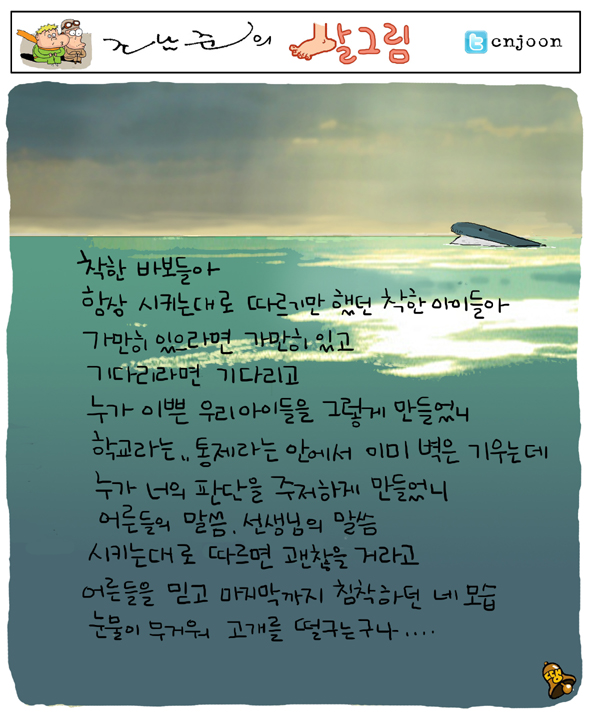You who always obeyed words, you good children
When told to stay you've stayed
when told to wait you've waited
Whoever made you act that way, my dear children
Inside the school, the control, where the walls are already caving in,
whoever made you hesitate making a judgement...
Words of adults, words of teachers,
that all was going to be fine if you'd followed their words.
Because you trusted the adults, you remained calm to the very end
Heavy with tears, we cannot bear to hold up our faces....
by Nam-Joon Cho
(I doubt the author would mind, but just in case, don't write to him to talk about copyright issues...)
I hope that the nuance of this poetry has well been translated to you in my choice of words.
For those of you who are curious about the comments underneath the picture, I can only say that they have misread the intention of the author. There is controversy around this poetry because people are interpreting the metaphor in the wrong way. Maybe because the press company Hankyoreh has always been critical about the current ruling party? (which is the conservative one, and I am very bad with politics, so I will not take this matter further into political level) I wouldn't know.
But from my point of view, the stress of this poetry is not on the rights and wrongs of the actual moment of the evacuation. Although 'the adults' were the ones that made the decision to send the kids back into their rooms, the writer is not trying to put the blame on the crew nor the teachers because he knows for sure that their intention was for the best. And surely he did not mean that children at that moment should have stopped listening to adults and acted on their own and went out of control.
Some commented that the author is trying to put the blame on the adults in general for not being able to save them(which I believe have already been cleared of, by my account), or metaphorically to criticize the educational system and even further the current government. But have they really read this carefully? Can they say with confidence that they are not biased with the notion of this particular press? How can anyone ever even think that someone is trying to use these poor souls to do that? It is unbelievable, really, to see how much bias affects a person's way of thinking.
I felt that the author tried to make an apology but could not bear to say the words, because words of apology will mean nothing to the already lost souls. And the 'fools' he is addressing are not only the students but the crews and teachers too. Not because they have not acted wisely but because they were innocent. We Koreans have been raised that way ever since I can remember. If not the parents, the school, the company, the society is constantly telling us; always to obey, never to talk back nor to raise a question. Control is yes, important to make things work, but in a suppressive environment like Korea, one can never be able to raise a hand for a different idea of his own whether they be right or wrong-even though they know that the leader's decision is wrong.
I am not the author and I am not writing this to depend him or anything. But I am sure that all he really wanted to do was to pay respect to the lost ones. So blame him for not have chosen the vocabulary more carefully, but please do not mistake the good intent.
'Translated by shaz' 카테고리의 다른 글
| 뮤지컬, 노래를 멈추고 제 목소리를 찾다 01 (0) | 2017.06.27 |
|---|---|
| [기사] 새롭게 들어보는 <숲속으로>: 오프 브로드웨이, 새로운 소리의 탄생기 (0) | 2015.02.10 |
| You Grew On Me - Tim Minchin (0) | 2014.04.02 |
| [아름다운 노랫말] 말하지 못한 내 사랑 - 김광석 (English) (0) | 2014.01.21 |
| Wal oder Meerjungfrau? (고래 아니면 인어?) (0) | 2013.01.16 |
